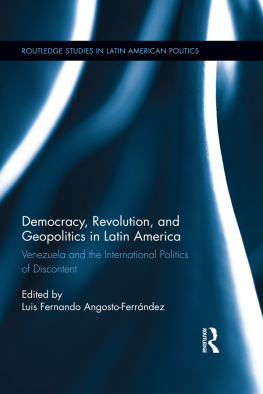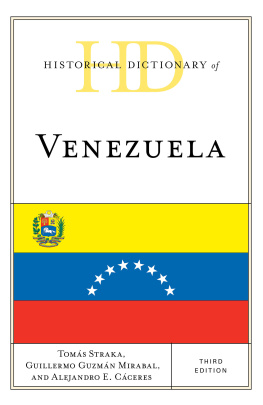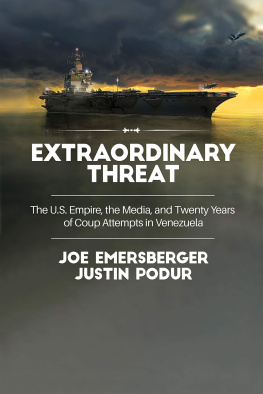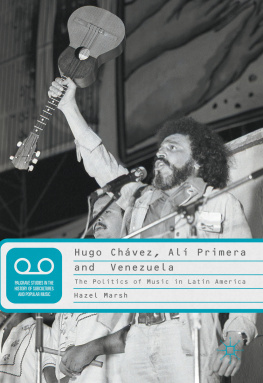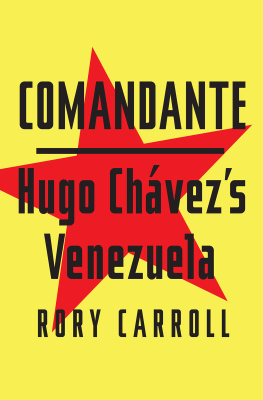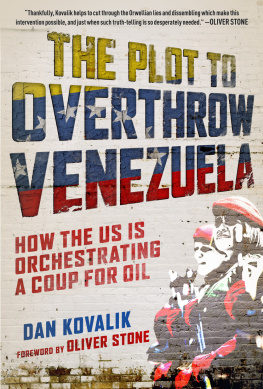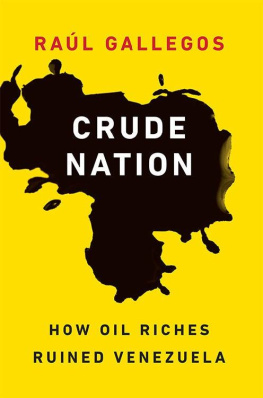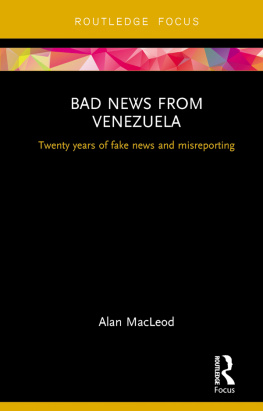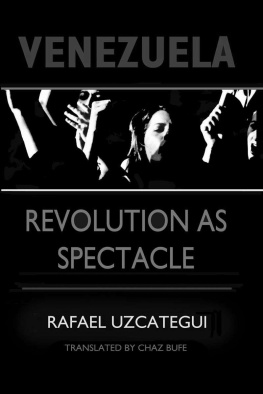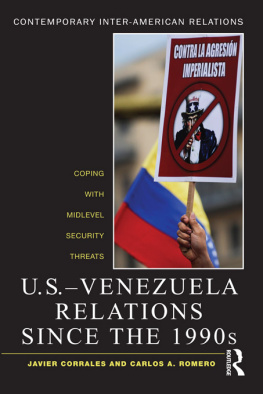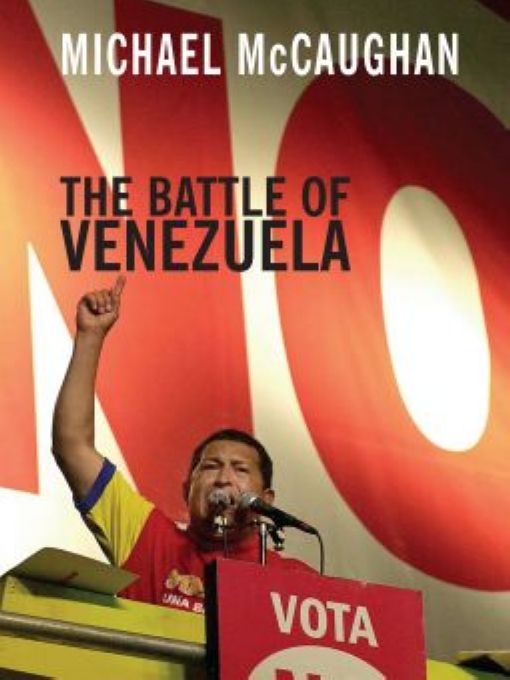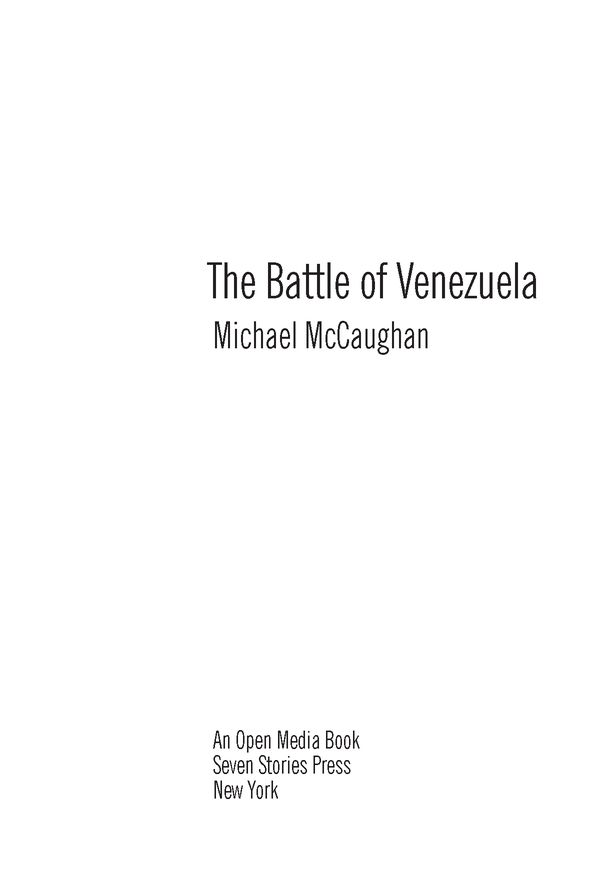Table of Contents
THIS BOOK IS DEDICATED TO MY DEAR FATHER
Acknowledgments
THIS BOOK EXISTS THANKS TO hundreds of Venezuelans who, over the past five years, stopped to talk with me, giving birth to a lively exchange of views and a number of valuable friendships. I havent a hope of remembering all the names, but a few spring to mind: Doris Theis, Augusto Montiel, Natali Vzquez, Francisco Prada, Leandro Area, Guido Zuleta, Zhandra Zuleta Castro, Carolina Troncone, Judith Galarza, Edith Gmez, Juan Vives, and many more.
My investigation into the killings of 11 April 2002 was made possible by Andrs Trujillo, who walked me through the massacre zone, Diogenes Lopez, Laura Salazar, Mohammet Merhi, and Florangel Valdez.
Pemn leader Silviano Castro welcomed me into his community, while documentary filmmaker Kim Bartley provided vital contacts and advice. Phil Gunson and Alberto Garrido patiently answered all questions, but the conclusions reached in this book are entirely of my own making.
I have great admiration for Douglas Bravo, a veteran with five decades of selfless activism behind him. He spent many hours talking me through the past fifty years of popular struggle in Venezuela.
Enrique Vila kindly handed over the blueprint for a new Venezuela, while government employees Ana Lisa Osorio, Zuli Hernndez, Maria Urbaneja, Leonett Ricaurte, and Jorge Giordani sparkled with enthusiasm, despite the difficulties they face. Thanks to Alex and Gilberto and all the presidents communication strategists for the regular news updates.
In the barrios, I found myself in the capable hands of Chuy and Elena, Cesar Azcanio, Ana Moreno, and the mighty Coromoto, working night and day to turn Petare into a community based on solidarity.
Journalist Andrs Izarra was a breath of fresh air in a nation where journalists are expected to act as PR agents for big business interests. I owe a debt of gratitude to Carolina Hernandez Ponce for the emergency dental work.
Closer to home, Ruby Wallis is my inspiration. Derek Speirs has been a constant source of wisdom and help, even outside office hours, while my family is there to answer every cry for help. Hail, hail Caroline, Paul, Liam, and Niall, the next generation. The Burren is my refuge where Steve and Dido, Chris and Sarah, Colin and Aine, Johnny, Marge, and Fatima have reinvented the term friendship and a gang of children struggle to remain free in a society that will stop at nothing to tame them. Love to Luke, Freddy, Gracie, Alba, Silkie, Riona, Joolzy, Leah, Saoirse, Erris, Femke, Lucchi, Poppy, Perry, Rimpy, and Lily. The biggest abrazo of all to Yasmin whose presence is felt in every corner of Cooloorta. Respect to Stephen, Ramor, Ixim, Ana, Danny Morrison, Christine Poland, Caoimhe Butterly, Erik Pedersen, David Gillespie, Heather, Roja Mhel, Ana Carrigan, Eamonn and Deirdre, Aoife and Suain, Tom and Susan, Adam and Emma, Bill and Emily, David Thompson, Barry Cooke, Jackie Bourke, Mairead, Matt and Yvette, Jarlath, Martha and Nick, Djennifer, Chelo, Una Ni Chiosain, Henry McLoughlin, Val Meikle, Luis Muoz, Lupita, Pepe Gil, Rosaelba Arroyo, Alex Cox, Naomi Klein, Avi Lewis, Javier, Tatiana, Vicente, Elisa, Tiroteo and Luz, Alicia Malla, Veronica and Leo, Andrew and Gail, Rocio, Fr. Shortall, Nuala Weber, Aldo Garcia, Jade and Saibhin, Micheal Fanning, Jenny McCrohan, Elizabeth and Joe, Eve, Dr Nightdub, Josephine Vahey, Monina Paz, Niall McGuirk, Yvonne Zimmerman, Dennis and Mary, John Jordan, and the lovely ladies at Simons Place, especially Simon. Last, but not least, peace and love to Lorraine Archer. The soundtrack to this book was provided by Eddie Vedder, Manu Chao, Ronan O Snodaigh, Damien Dempsey, Rage Against the Machine, The Clash, Mike Scott, and Sinead OConnor. Joe Strummer, I miss you.
Anyone wishing to contact me may do so at
michaelmccaughan@gmail.com.
Updated Introduction to the U.S. Edition
I dont believe in the dogmatic postulates of Marxist revolution. I dont accept that we are living in a period of proletarian revolutions. Reality is telling us that every day. But if I am told that because of that reality you cant do anything to help the poor, then I say, We part company.
President Chvez, interviewed by Tariq Ali1
We all know about the adventures and misadventures of the CIAthats a reference to a comic book, by the wayabove all in this continent. But the CIA has lost a little of its James Bond image. Mind you, James Bond isnt what he used to be. In fact hes never been the same since Sean Connery stopped playing the part. And what about Tarzan? His reputation has taken a bit of a battering. And Dracula? Not the same since the days of Bela Lugosi. Or Supermanwhat bad luck that actor had. Batman just disintegrated. And as for Robin... the CIA as well, I think the same phenomenon has affected all of them.
President Chvez, responding to charges
that the CIA plotted to overthrow him2
IN AUGUST 2004, Venezuelan president Hugo Chvez overwhelmingly defeated a recall referendum aimed at cutting short his period in office. Six million citizens voted in favor of Chvez, accounting for some 58 percent of votes cast. A record turnout of 70 percent of eligible voters highlighted Venezuelas enthusiasm for the democratic process, while international observers, regarded at best as cautious if not downright hostile to Chvez, ratified the process as free and fair. The result was a humiliating defeat for a middle- and upper-class opposition that lacks leadership and has failed to present an alternative political project. President Chvez is now well placed to win reelection in the 2006 presidential race, keeping him in power until January 2013.
When Chvez assumed office in 1998 Venezuelas displaced political class viewed the arrival of this intruder as a temporary interruption to a long-term power-sharing arrangement. Once Chvez worked out the arithmetic, they believed the inexperienced statesman would be forced to tone down his rhetoric, cut a deal with the economic elite, and rely on his charisma to keep the disillusioned masses in line. If all else failed, the nations security forces could be called upon to bridge the gap between expectation and reality.
With an attempted coup detat in 2002, a failed general strike, and an unsuccessful recall referendum in 2004 behind him, Hugo Chvez is firmly in the drivers seat as record oil revenues fuel a social spending spree that keeps the poor firmly at his side. The Chvez phenomenon has had a cataclysmic effect on the nations political, business, church, and media elite, which have lost their implacable grip on the countrys institutions.
In the political era preceding Chvez (1958-1998), Accin Democrtica (AD) and Christian democrats (COPEI) were elected by the people, but governed on behalf of foreign and local business leaders, the oil industry, church hierarchy, and media owners. The current shift in power relations has opened up the first real opportunity for lasting social change since the independence struggle of the nineteenth century.
It would be nave to assume that the 2004 referendum result signals an end to opposition efforts to unseat Chvez. The crushing defeat has forced a temporary retreat that may well prove to be no more than a lull on the battlefield. In addition, it appears that the Bush administration is once more gearing up to undermine, discredit, and, perhaps, overthrow Chvez, accusing him of meddling in the region. In the first six weeks of 2005, Chvez was accused of interfering in three neighboring nations. Peruvian daily


